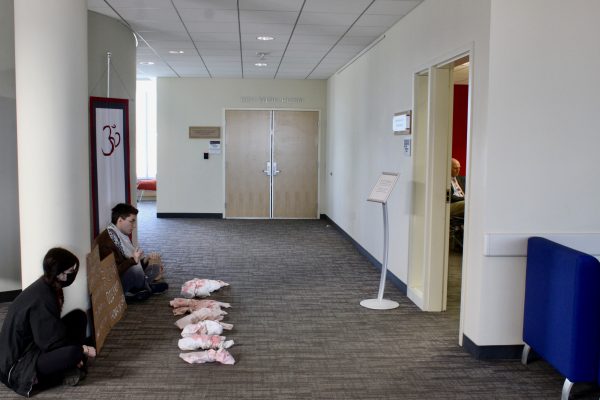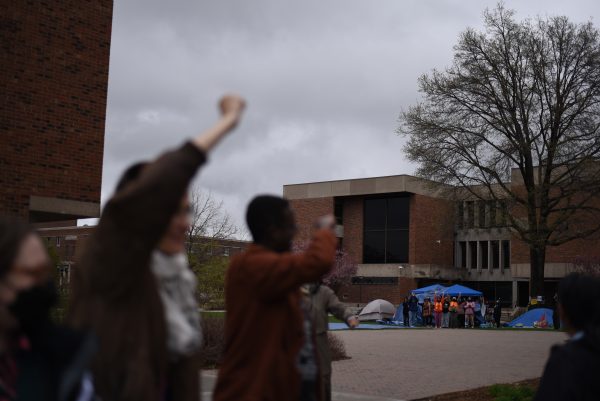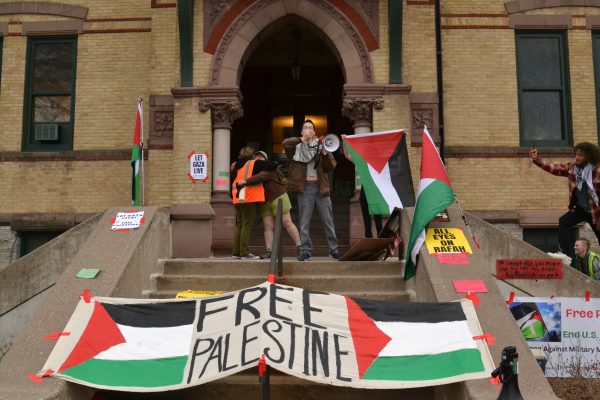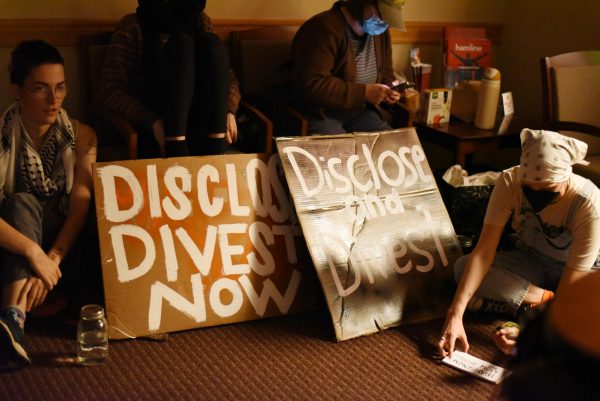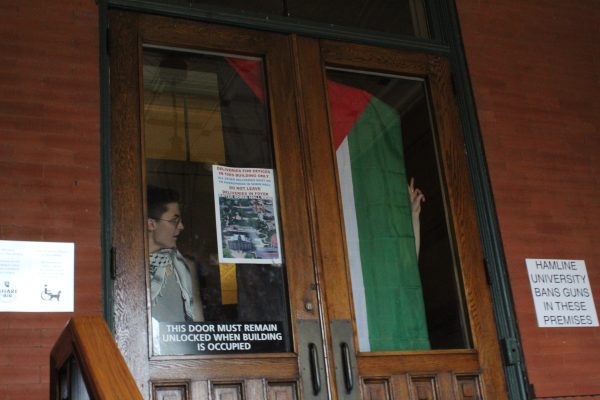Justice for Jamar
Hamline students take part in a protest on Wednesday night for the shooting of Jamar Clark.
April 6, 2016
“No justice, no peace! Prosecute the police!” The crowd said in unison. On Wed. Mar. 29, peaceful protesters took to the streets of downtown Minneapolis demanding “Justice for Jamar.”
Earlier that day, Hennepin County Attorney Mike Freeman described the fatal shooting in November of an unarmed black man, Jamar Clark, by the police. He ultimately released the decision that the two officers involved in the death of Clark would not face charges.
Freeman has cited evidence collected after the shooting in North Minneapolis to make the statement that this case is not comparable to other controversial police shootings that have occurred throughout the country.
However, community members have questions that remain unanswered. Minneapolis NAACP, Black Lives Matter and other activists argue that the evidence presented in the case, conversely, points to officers Mark Ringgenberg and Dustin Schwarze as the aggressors. The non-indictment verdict reflects the dichotomy between police officers and members of the black community.
Another point of contention in the community was the fact that video footage of the shooting was not released until months after Clark’s death—months of protesting and community members questioning the police department’s lack of transparency.
“These are the things that foster distrust in our communities in a time where trust in public institutions are already at an all time low,” said Shay Mitchell (‘16). “Body cams could be a good first step, but if the footage is going to be withheld from the public when there is concern about an incident, what purpose does that footage really serve?”
Many Hamline students joined the protest on Wednesday in solidarity— demanding, along with everyone present, that something change. Police departments may take firsts steps towards change with increased transparency, standardized and accessible record keeping, and prioritized efforts towards positive relations with the public.
“I was disappointed but not surprised about the decision,” said Farhiya Ali (‘19). “Our police departments across the country needs to be reformed.”
Mitchell expressed similar sentiments. “[They] have a lot of work to do to fix the relationship they have with our communities,” he said.
One group began at the location of the Nov. 15 shooting on Plymouth Avenue N., gathering in the hundreds as they marched toward the downtown Government Center. Though the protesters sang, chanted and danced through the streets, the atmosphere was palpably heavy.
Lupita Herrera (‘19) talked about her experience hearing the story of another protester she met.
“He said that he was alive during the time when he couldn’t share anything with white people,” she said. “They wouldn’t even walk on the same side of the street.”
She explained the point of view he expressed: “we’ve made progress in the sense that, yes, he can now share a bathroom with a white person, but what does that mean when his people are still dying?”
“How do we get to the point where people of color aren’t literally learning methods and ways of surviving in a world like this… of not getting killed by people of authority meant to protect?” Herrera said.
As the daylight hours dwindled, the march moved back to the North Side site of Clark’s shooting; his family and neighbors also gathered at the scene. Candles were lit, music played, and a memorial for Clark—golden balloons in the letters of his name, bundles of flowers, and heavy-hearted messages scrawled across photos of him—clung to a tree.
“Our local law enforcement should feel ashamed and enraged that there are people in their community that feel anything less than protected when they see an officer or squad car,” said Mitchell. “Public entities should not question whether or not my fear of their institution is valid.”
Police brutality, related issues of racial inequality, and subsequent resistance are not recently developed realities in history or in the public’s awareness– in terms of Minnesota or the United States as a whole.
“We’ve been talking. Now it is time they listen,” Mitchell said.
Rights when interacting with the police
Do you have to identify yourself to police?
A few states have “Stop and Identify” statutes that require someone suspected of criminal activity to provide identification; in other words, to refuse is a crime.
Sources: http://www.latimes.com/local/lanow/la-me-ln-daniele-watts-lapd-show-id-20140915-story.html
In Minnesota, there is no statute that specifically describes when police can ask for ID and when you have to comply.
http://legacy.kare11.com/story/news/local/2014/08/29/when-must-you-show-id-to-police/14825985/
Can a police officer search your car?
Probable cause means police need some facts or evidence that suggest your involvement in criminal activity. In other words, officers cannot act on a hunch of illegal activity without evidence to search your car. Before searching, the officer must observe something real.
Source: https://www.flexyourrights.org/faqs/when-can-police-search-your-car/
How do I report police misconduct?
Step 1: Write everything down. Describe the entirety of the encounter in your own words. Make your best effort to use exact words when quoting. Specify details about the location, time of day, etc. Only include the facts that you’re certain about. Take care to avoid inaccuracies, as they can easily damage your credibility and undermine the rest of your important work. You don’t necessarily need the badge or car number. An officer’s identity can be established with a time, location, and physical description.
Step 2: Consult with an attorney
This step is essential if you were arrested following the incident. (If you were not arrested, it’s optional but recommended.)
Whether or not you were charged with a crime following the incident, you might still want to pursue a civil suit against the police. An attorney will help you determine whether you have a strong enough case. Do not get upset if you can’t find an attorney to take your case. Simply proceed to Step 3.
Step 3: File a Police Misconduct Report
This step cannot begin until all criminal charges and civil actions have been resolved. Prematurely filing a police misconduct report will hurt your chances in court by revealing too much information to the police.
Source: https://www.flexyourrights.org/faqs/how-to-report-police-misconduct/
What are my rights in a college dorm?
The rental agreement for your dorm room should specify when school officials may or may not enter, so make sure you’re familiar with the terms of your lease and keep a copy on hand. In many cases, student housing affords less privacy protection than a standard rental agreement, so be mindful of the potential for random inspections and other intrusions that are common on college campuses.
Building good relationships with the people around you is the best strategy for preventing problems before they occur.
Sources: https://www.flexyourrights.org/faqs/what-are-my-rights-in-a-college-dorm/

